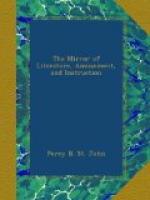Turn we now to Jonathan Hookey, the barber. In person he differed much from Merton. His height did not exceed five feet, but, he made amends for it in breadth; for he was a man of a lusty habit, and sported a paunch which no London alderman or burgomaster of Amsterdam would look upon with contempt. Bald was his head, and his nose was not merely large but immense; but it is idle to grow eloquent upon noses. Has not Sterne exhausted the theme? have not we ourselves more than once expatiated upon it? Swakenbergius had a nose, so had Ovidius Naso; but to neither would Jonathan Hookey’s strike its colours, and good crimson ones they were.
Jonathan, despite his bald head, his diminutive stature, his ample pot-belly, and ampler nose, was a man of fine feelings. Nature was outraged when he became a barber. He most assuredly was never destined by her to shave beards, and manufacture perukes for heads more brainless, many of them, than his own blocks. He ought to have been a professor of metaphysics or logic in some famous university, such as Heidelburg, Gottingen, or Glasgow;—but why lament over cureless evils? it is sufficient to say he is a barber, and there is an end of the matter.
We must now return to Merton. His solitary walks on the opposite side of the street had not even, from the first, escaped the scrutinizing eyes of Mr. Hookey. No: he saw in the tall, pale, elegant, dark-haired student the victim of deep sensibility. From seeing him, he wondered, from wondering he loved him, from loving he adored him: he knew at once he was no common man. Having perused Byron’s Manfred, he conceived him to be such another as that strange character; or he might be a second Lara; or, more, he might be, nay he was, a glorious genius, full of high imaginings. Little do we know what bright thoughts passed through the mind of the enthusiastic Hookey. He cursed his profession, which debarred him from the fellowship of such a man: he cursed his nose, which stood between him and the object of his adoration.
Day after day had Mr. Hookey noticed the accomplished, the highly-gifted Merton; but it was only upon this particular morning that the recognition was mutual. Merton, on turning his eyes by chance from the ground, looked to the opposite side of the street, and there beheld a nose. He then turned his eyes to the earth in his usual meditative mood; but, reflecting that a nose without an owner was rather a singular phenomenon, he looked a second time, and there, behind the nose, he saw a man; it was Mr. Hookey himself.
This was the first time that the melancholy and intellectual student reciprocated upon Hookey the attention which Hookey had hitherto bestowed exclusively upon him. No more was the barber’s “sweetness wasted upon the desert air,” but fell on one who knew how to appreciate it to its fullest extent. Merton stood stock-still, and gazed upon him with mute admiration. He was positively fascinated. The nose operated




